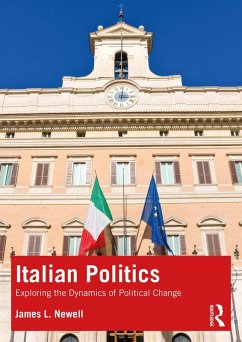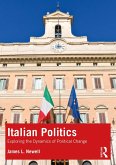Dieser Download kann aus rechtlichen Gründen nur mit Rechnungsadresse in A, B, BG, CY, CZ, D, DK, EW, E, FIN, F, GR, HR, H, IRL, I, LT, L, LR, M, NL, PL, P, R, S, SLO, SK ausgeliefert werden.
Luigi Ceccarini, University of Urbino Carlo Bo, Italy; President of the Italian Society of Electoral Studies (SISE)
'In this short, erudite work James L. Newell, as one of our foremost Italian specialists, brings his highly perceptive analysis and insights to create a vivid explanation of Italian politics today through the historic lens of the watershed period of the early 1990s, leaving us with an intriguing sense of what might still be to come.'
Martin J. Bull, Professor of Politics, University of Salford, UK









